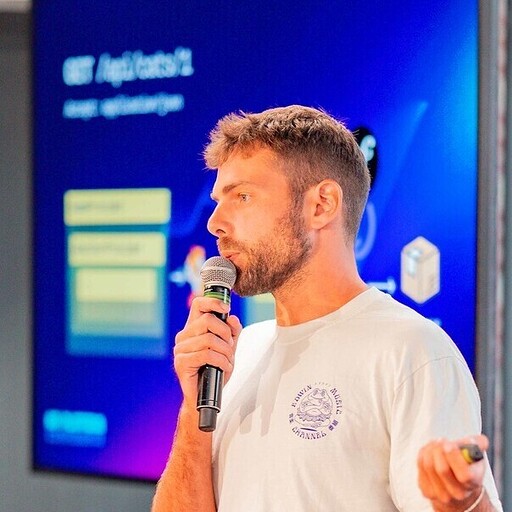Symfony Certification
Curious about Symfony certification? Let's discover what it is, why it matters, how long it takes, and key tips for an effective preparation!

 Hugo Alliaume
Hugo Alliaume
Symfony developers today face a choice: stick with Webpack Encore, adopt the new AssetMapper, or explore other alternatives...
I'm often asked about the current state of Webpack Encore in the Symfony ecosystem, its relevance, and what the future holds. Is still a viable option? What about AssetMapper? Is there better alternative?
This article reviews where we are today, compares the options, and looks ahead.
Webpack Encore is a simple way to integrate webpack into your Symfony application. It was formerly the default asset management tool in Symfony applications, allowing developers to manage and compile their frontend assets (JavaScript, CSS, images, etc.) easily.
Webpack Encore was created by Ryan Weaver (❤️) in March 2017 and has been the default asset management tool in Symfony for many years. It allows developers to use modern JavaScript features and libraries, such as ES6 modules, optimized chunks, React, Vue.js, and more.
Many years later, Webpack Encore is still maintained and updated, but its popularity has declined with the introduction of Symfony AssetMapper, and the rise of more modern and faster tools like Vite (or ESBuild, Rspack, etc...).
Since Symfony 6.3, a new component called AssetMapper has been introduced.
It's the new recommended way to manage frontend assets in Symfony applications, without the need for Node.js or a bundler like Webpack Encore. Thanks to browsers' native support for ES modules and import maps, AssetMapper allows you to use modern JavaScript features and libraries directly in the browser.
The Symfony AssetMapper is a great alternative to Webpack Encore for small to medium-sized projects that don't require complex asset management.
Personally, as a Node.js and bundlers enthusiast, I often prefer using a full Node.js toolchain (with code quality & testing tools) and Webpack Encore for my projects, except for very small projects that I don't really care about and where AssetMapper is perfectly fine.
Vite is a modern frontend build tool that has gained popularity in recent years due to its speed and simplicity. It offers a much faster development experience compared to traditional bundlers based on webpack, thanks to its use of native ES modules and on-demand file serving.
Recently, on July 27, 2025, Vite overtook Webpack as the most downloaded JavaScript bundler on npm (npmtrends.com/vite-vs-webpack).
Vite was already very fast and efficient, and it will soon integrate Rolldown, a Rust-based bundler, which will make it even faster.
Vite can easily be integrated into Symfony applications using the lhapaipai's Vite Bundle.
Here's a quick comparison of Webpack Encore, Symfony AssetMapper, and Vite:
| Feature | Webpack Encore | AssetMapper | Vite |
|---|---|---|---|
| Setup complexity | Medium | Very low | Medium |
| Performance | Good | Very good | Excellent |
| Ecosystem | Huge and stable | Symfony-only | Huge & growing |
| Best for | Legacy/complex projects | Small/medium projects | Modern projects |
| Symfony status | Legacy, but still maintained | Recommended default | Community bundle |
With the rise of Symfony AssetMapper and Vite, the future of Webpack Encore may be uncertain.
While it is still maintained and updated (especially Webpack & loaders upgrades), webpack itself is becoming less popular and relevant in the frontend ecosystem:
In February 2024, I opened a discussion about Webpack Encore's future suggesting that Webpack Encore should be deprecated in favor of Vite, and make lhapaipai's Vite Bundle the official alternative to Webpack Encore, under the Symfony organization.
Things didn't move much since then, but I believe that in the next few years, Webpack Encore will be gradually phased out in favor of more modern and efficient tools like Vite.
The future of Webpack Encore is a bit uncertain, but it is still maintained and updated for now. As the frontend ecosystem continues to evolve, developers should consider their project requirements and choose the most suitable tool for their needs.
In the future, Webpack Encore might internally use Rspack to stay relevant and fast… who knows! 👀
Stay tuned! 🚀